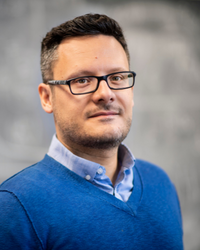
- This event has passed.
Oliviero Andreussi - Multiscale models for the computational design of materials
October 27, 2022 @ 10:00 am MDT
Event Navigation

Oliviero Andreussi
Associate Professor
Boise State University
Multiscale models for the computational design of materials
Biography
Dr. Oliviero Andreussi received his undergraduate and PhD degrees in Physical Chemistry from Scuola Normale Superiore of Pisa, Italy. As a postdoctoral researcher, Dr. Andreussi worked in the Departments of Materials Science and Engineering at the Massachusetts Institute of Technology, the University of Oxford, and the Swiss Federal Institute of Technology in Lausanne (EPFL). After a few more years in Italy and Switzerland as a researcher in computational chemistry and materials science, Dr. Andreussi joined the Department of Physics at the University of North Texas as an Assistant Professor in 2018. In August 2022, Dr. Andreussi joined the Department of Chemistry at Boise State University as an Associate Professor. His group studies environment effects on wet electrified interfaces, aiming to design new materials for chemical devices and electro-catalysis. He was awarded an NSF CAREER Award in 2020.
Abstract
Atomistic computer simulations have become one of the key tools to characterize materials properties and provide design strategies for new materials and devices. However, many processes (corrosion, catalysis) and devices (energy conversion, chemical sensing) of technological relevance require the characterization of wet, possibly electrified, interfaces of materials. The statistical nature and macroscopic scale of liquid solutions and electrolytes pose significant limitations to the computational design of materials for these applications. Recent advances in multiscale models in condensed-matter simulations allow to capture environment effects on material surfaces at a reduced computational cost, thus unlocking the possibility to perform high-throughput simulations over a wide range of compounds. Here, the core methodological aspects and features of these approaches will be reviewed. Applications to the screenings of two-dimensional materials as electrocatalysts for the water splitting and recombination reactions will be presented.